【人教版】英语七年级下册《期末考试试卷》含答案
人教版七年级下册英语期末考试试题附答案
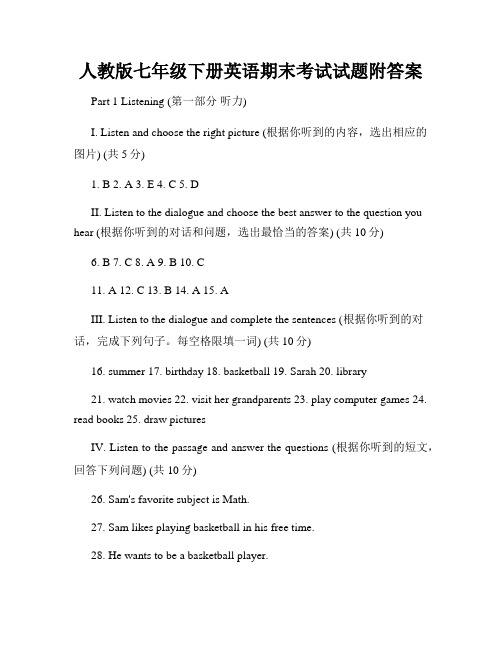
人教版七年级下册英语期末考试试题附答案Part 1 Listening (第一部分听力)I. Listen and choose the right picture (根据你听到的内容,选出相应的图片) (共5分)1. B2. A3. E4. C5. DII. Listen to the dialogue and choose the best answer to the question you hear (根据你听到的对话和问题,选出最恰当的答案) (共10分)6. B7. C8. A9. B 10. C11. A 12. C 13. B 14. A 15. AIII. Listen to the dialogue and complete the sentences (根据你听到的对话,完成下列句子。
每空格限填一词) (共10分)16. summer 17. birthday 18. basketball 19. Sarah 20. library21. watch movies 22. visit her grandparents 23. play computer games 24. read books 25. draw picturesIV. Listen to the passage and answer the questions (根据你听到的短文,回答下列问题) (共10分)26. Sam's favorite subject is Math.27. Sam likes playing basketball in his free time.28. He wants to be a basketball player.29. Sam has a brother and a sister.30. Sam's favorite game is chess.Part 2 Phonetics, Vocabulary and Grammar (第二部分语音、词汇和语法)V. Choose the best answer (选择最恰当的答案) (共15分)31. A 32. C 33. B 34. A 35. A36. B 37. C 38. A 39. B 40. A41. B 42. A 43. C 44. A 45. BVI. Fill in the blanks with the words given (根据所给单词,填空) (共10分)46. safely 47. studying 48. taking 49. faster 50. easy51. carefully 52. asking 53. useful 54. interesting 55. winnerVII. Rewrite the following sentences as required (根据所给要求,改写句子) (共10分)56. Does she have any magazines? -> She doesn't have any magazines.57. There are some beautiful flowers in the garden. -> Are there any beautiful flowers in the garden?58. The cat is sleeping under the tree. -> Where is the cat sleeping?59. Tom usually eats breakfast at home. -> Where does Tom usually eat breakfast?60. My brother is interested in playing basketball. -> What is your brother interested in?VIII. Complete the sentences with the given words in their proper forms (用括号中所给单词的适当形式完成下列句子) (共10分)61. harder 62. hottest 63. cleaner 64. faster 65. more interesting66. more exciting 67. more slowly 68. less crowded 69. more careful 70. betterPart 3 Reading and Writing (第三部分阅读和写作)IX. Reading comprehension (阅读理解) (共30分)A) Read the passage and choose the best answer (根据短文内容,选择最恰当的答案) (共6分)71. A 72. C 73. B 74. A 75. B 76. CB) Choose the words or expressions and complete the passage (选择最恰当的单词或词语完成短文) (共6分)77. listening 78. of 79. instead 80. to 81. few 82. enjoysC) Read the passage and fill in the blanks with proper words (在短文的空格内填入适当的词,使其内容通顺,每空格限填一词) (共6分)83. look after 84. own 85. my 86. take care of 87. helps 88. withD) Read the passage and answer the questions (根据短文内容,回答下列问题) (共12分)89. His cousin's name is Tom.90. Tom is 14 years old.91. Tom speaks English well.92. Tom's birthday is on March 15th.93. Tom's favorite subject is Geography.94. Tom is interested in collecting stamps and playing the guitar.X. Writing (写作) (共15分)95. 参考答案略,可根据具体试题来确定。
人教版七年级下册英语《期末考试试卷》含答案
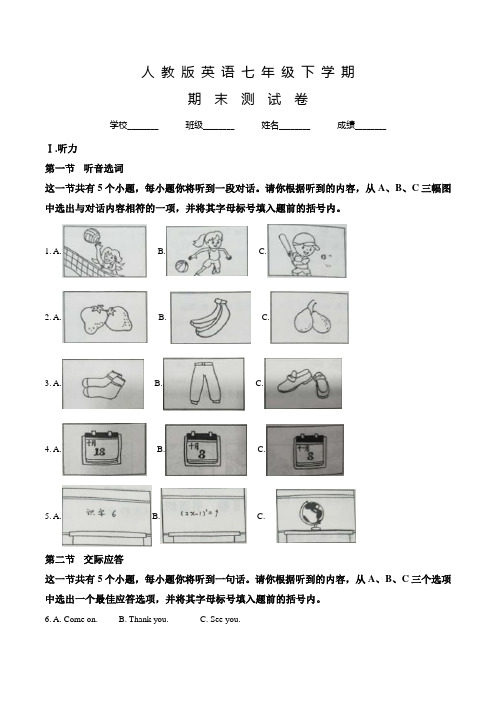
人教版英语七年级下学期期末测试卷学校________ 班级________ 姓名________ 成绩________Ⅰ.听力第一节听音选词这一节共有5个小题,每小题你将听到一段对话。
请你根据听到的内容,从A、B、C三幅图中选出与对话内容相符的一项,并将其字母标号填入题前的括号内。
1. A. B. C.2. A. B. C.3. A. B. C.4. A. B. C.5. A. B. C.第二节交际应答这一节共有5个小题,每小题你将听到一句话。
请你根据听到的内容,从A、B、C三个选项中选出一个最佳应答选项,并将其字母标号填入题前的括号内。
6. A. Come on. B. Thank you. C. See you.7. A. Let me get it. B. Rice and vegetables. C. Sounds great.8. A. It’s on the desk. B. He has a baseball. C. That is his baseball9. A. It’s at 9:00. B. It looks fun. C. It’s great.10. A. School Day. B. Twenty teachers. C. That’s for sure.第三节对话理解这一节共有5个小题,每小题你将听到一段对话和一个问题。
请你根据听到的内容和提出的问题,从A、B、C三个选项中选出一个最佳选项,并将其字母标号填入题前的括号内。
11. A. Bread. B. Salad. C. Hamburgers.12. A. On Tuesday. B. On Wednesday. C. On Thursday.13. A. Blue. B. Black. C. Green.14. A. One jacket. B. Two T-shirts. C. Three T-shirts.15. A. Becau se it’s interesting.B. Because her history teacher is cool.C. Because she can learn about Chinese history.第四节听力填空这一节你将听到一篇短文。
人教版七年级英语下册期末试卷(含答案)

七年级下册期末试卷英语一、听力技能(共两节, 共20小题, 计20分)第一节对话理解根据所听到的对话, 从题中所给的A.B.C三个选项中选出最佳答案回答问题。
(共5小题, 计5分)听下面五段对话, 每听完一段对话后, 回答1个小题。
1.What does the boy want to do this afternoon?A.T.visi.th.farm.B.T.pic.strawberries.C.T.g.fishing.2.Wha.didn’.th.bo.se.yesterday?A..koala.B.A.elephant.C..panda.3.What does Lucy look like?A.Sh.wear.glasses.B.Sh.wear..hat.C.Sh.wear..watch.4.Wha.doe.th.bo.lik.fo.lunch?A.Rice.B.NoodlesC.Dumplings5.Wher.ar.th.candles?A.I.th.box.B.O.th.box.C.Unde.th.box.第二节听下面6段对话或独白。
每段对话或独白后有2-3个小题, 从题中所给的A.B.C三个选项中选出最佳选项回答问题。
(共15小题, 计15分)听第六段对话, 回答第6.7小题。
6.Whe.di.Mike’.uncl.leav.th.hotel?A.Tw.year.ago.B.On.yea.ago.C.On.mont.ago.7.Wher.doe.Mike’.aun.wor.now?A.I..supermarket.B.I..library.C.I..hospital.听第七段对话, 回答第8至9小题。
8.Whe.di.Susa.ge.u.thi.morning?A.A.6:45.B.A.7:15.C.A.7:45.9.Wha.kin.o.animal.di.Susa.tak.fort.photo.of?A.Tigers.B.Elephants.C.Pandas.听第八段对话, 回答第10至11小题。
人教版英语七年级下册《期末考试卷》含答案解析
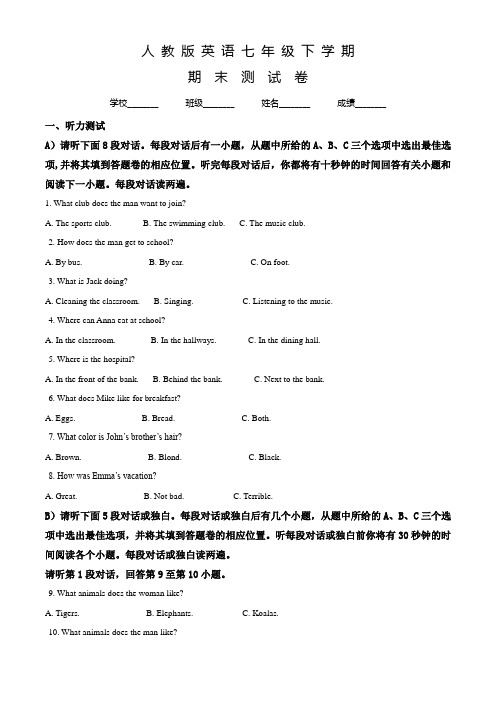
人教版英语七年级下学期期末测试卷学校________ 班级________ 姓名________ 成绩________一、听力测试A)请听下面8段对话。
每段对话后有一小题,从题中所给的A、B、C三个选项中选出最佳选项,并将其填到答题卷的相应位置。
听完每段对话后,你都将有十秒钟的时间回答有关小题和阅读下一小题。
每段对话读两遍。
1. What club does the man want to join?A. The sports club.B. The swimming club.C. The music club.2. How does the man get to school?A. By bus.B. By car.C. On foot.3. What is Jack doing?A. Cleaning the classroom.B. Singing.C. Listening to the music.4. Where can Anna eat at school?A. In the classroom.B. In the hallways.C. In the dining hall.5. Where is the hospital?A. In the front of the bank.B. Behind the bank.C. Next to the bank.6. What does Mike like for breakfast?A. Eggs.B. Bread.C. Both.7. What color is John’s brother’s hair?A. Brown.B. Blond.C. Black.8. How was Emma’s vacation?A. Great.B. Not bad.C. Terrible.B)请听下面5段对话或独白。
每段对话或独白后有几个小题,从题中所给的A、B、C三个选项中选出最佳选项,并将其填到答题卷的相应位置。
人教版七年级下册英语期末试卷及答案
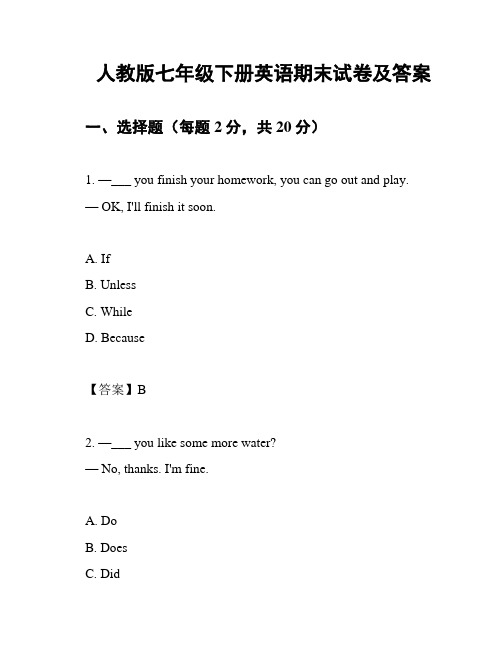
人教版七年级下册英语期末试卷及答案一、选择题(每题2分,共20分)1. —___ you finish your homework, you can go out and play. — OK, I'll finish it soon.A. IfB. UnlessC. WhileD. Because【答案】B2. —___ you like some more water?— No, thanks. I'm fine.A. DoB. DoesC. DidD. Would【答案】D3. I usually go to school by ___.A. busB. carC. bikeD. train【答案】C4. There are seven days in a ___.A. weekB. monthC. yearD. day【答案】A5. My mother is a ___. She teaches English in a primary school.A. doctorB. teacherC. engineerD. lawyer【答案】B6. There are ___ letters in the mailbox.A. too manyB. too muchC. a lot ofD. lots of【答案】D7. I have two ___. They are both engineers.A. brothersB. sistersC. friendsD. cousins【答案】A8. The weather today is very ___. It's sunny and warm.A. goodB. niceC. badD. fine【答案】D9. Can you help me ___ my homework?A. to doB. doC. doingD. done【答案】A10. She is ___ than her sister.A. as tallB. tallerC. as highD. higher【答案】B二、完形填空(每题2分,共20分)Once upon a time, there was a little girl named Sarah. She lived in a small village with her parents. Sarah was very ___1__1. She loved tolearn new things and read books. One day, Sarah's mother gave her a___1__2 to read. It was called "The Secret Garden". Sarah ___1__3 the book. She thought it was wonderful. She ___1__4 to read it every day. The book made Sarah ___1__5. She started to ___1__6 more plants and learn about nature. Sarah's mother was ___1__7. She was happy that Sarah was ___1__8. She knew that Sarah would ___1__9 a great person one day. Sarah ___1__10. She was a smart and kind girl. She ___1__11 many friends in the village. They all loved to ___1__12 with Sarah. Sarah was a ___1__13 person. She always ___1__14 to help others. One day, Sarah found a ___1__15 in the village. It was an old woman who needed help. Sarah ___1__16 to take care of her. She ___1__17 the old woman every day. The old woman ___1__18 Sarah's kindness. She___1__19 Sarah a friend. Sarah was ___1__20. She was happy to have a new friend.1. Sarah was very ___1__1.A. lazyB. smartC. sillyD. tired【答案】B2. Sarah's mother gave her a ___1__2 to read.A. storybookC. science bookD. history book【答案】A3. Sarah ___1__3 the book.A. hatedB. lovedC. ignoredD. threw away【答案】B4. She ___1__4 to read it every day.A. wantedB. neededC. had toD. wanted to【答案】D5. The book made Sarah ___1__5.A. excitedB. sadC. angryD. tired【答案】A6. She started to ___1__6 more plants and learn about nature.A. drawB. cookC. growD. clean【答案】C7. Sarah's mother was ___1__7.A. angryB. happyC. sadD. surprised【答案】B8. She was happy that Sarah was ___1__8.A. lazyB. smartC. sillyD. tired【答案】B9. Sarah would ___1__9 a great person one day.B. stayC. remainD. keep【答案】A10. Sarah ___1__10.A. criedB. laughedC. smiledD. shouted【答案】C三、阅读理解(每题5分,共25分)Passage 1:Once upon a time, there was a king who had a beautiful daughter. She was called Princess Alice. Alice was very kind and ___1__1. One day, a ___1__2 came to the castle. He ___1__3 to see Alice. The___1__4 was very ___1__5. He ___1__6 Alice a ___1__7. Alice___1__8 the proposal. She ___1__9 to find her ___1__10. So, she___1__11 on a ___1__12 to find him. After a long ___1__13, she found him. Alice ___1__14 him. They got ___1__15 and lived ___1__16 ever after.1. Alice was very ___1__1.A. tallB. kindC. smartD. pretty【答案】B2. A ___1__2 came to the castle.A. princeB. doctorC. teacherD. farmer【答案】A3. He ___1__3 to see Alice.A. wantedB. neededC. had toD. decided【答案】A4. The ___1__4 was very ___1__5.A. king; niceB. prince; richC. teacher; smartD. doctor; tall【答案】B5. He ___1__6 Alice a ___1__7.A. asked; questionB. proposed; marriageC. demanded; giftD. suggested; plan【答案】BPassage 2:Last summer, my family and I went on vacation to the beach. We ___1__1 to the beach every year, and we love it. On the first day, we ___1__2 for a walk on the ___1__3. The ___1__4 was very ___1__5. We saw many ___1__6, ___1__7, and ___1__8. In the ___1__9, we___1__10 on the ___1__11. It was very ___1__12. We had a ___1__13 time.1. We ___1__1 to the beach every year.A. goB. driveC. walkD. ride【答案】A2. We ___1__2 for a walk on the ___1__3.A. played; sandB. built; sandcastleC. walked; beachD. swam; ocean【答案】C3. The ___1__4 was very ___1__5.A. weather; sunnyB. ocean; calmC. beach; crowdedD. sky; clear【答案】A4. We saw many ___1__6, ___1__7, and ___1__8.A. birds; fish; wavesB. plants; rocks; shellsC. people; dogs; carsD. clouds; planes; birds【答案】B5. In the ___1__9, we ___1__10 on the ___1__11.A. morning; played; sandB. afternoon; built; sandcastleC. evening; walked; beachD. night; swam; ocean【答案】B四、翻译(每题5分,共25分)1. 翻译以下句子:我的姐姐是一名医生。
完整版)人教版七年级下册英语期末考试题及答案
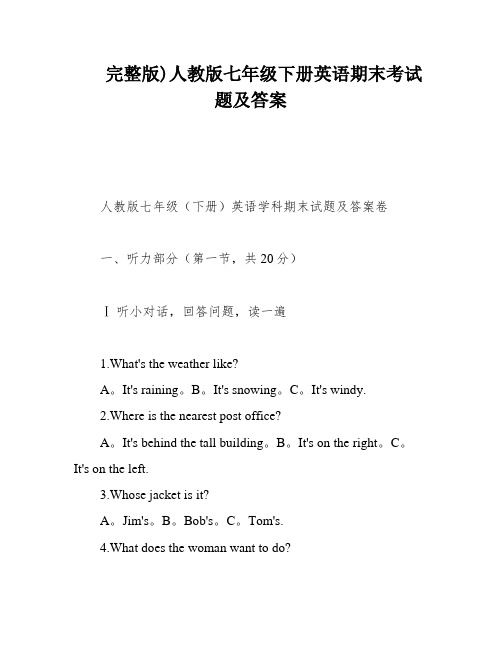
完整版)人教版七年级下册英语期末考试题及答案人教版七年级(下册)英语学科期末试题及答案卷一、听力部分(第一节,共20分)Ⅰ听小对话,回答问题,读一遍1.What's the weather like?A。
It's raining。
B。
It's snowing。
C。
It's windy.2.Where is the nearest post office?A。
It's behind the tall building。
B。
It's on the right。
C。
It's on the left.3.Whose jacket is it?A。
Jim's。
B。
Bob's。
C。
Tom's.4.What does the woman want to do?A。
She wants to go swimming。
B。
She wants to go skating。
C。
She wants to do some reading.5.Which country is Mary in?A。
The USA。
B。
China。
C。
Canada.Ⅱ听问题,选出最佳答语。
6.Where are you?A。
At school。
B。
In the school。
C。
Yes。
I can.7.Are you running?A。
No。
I'm not。
B。
Walking。
C。
May 1st.8.What subject do you have on Friday?A。
Friday。
B。
English。
C。
Comedy.9.Where is the music festival held?A。
In Tokyo。
B。
The music club。
C。
July.10.Do you like science?A。
Yes。
I do。
B。
At 6:00.C。
Because it's interesting.Ⅲ对话理解。
人教版英语七年级下册第二学期期末测试卷(含答案+听力原文)
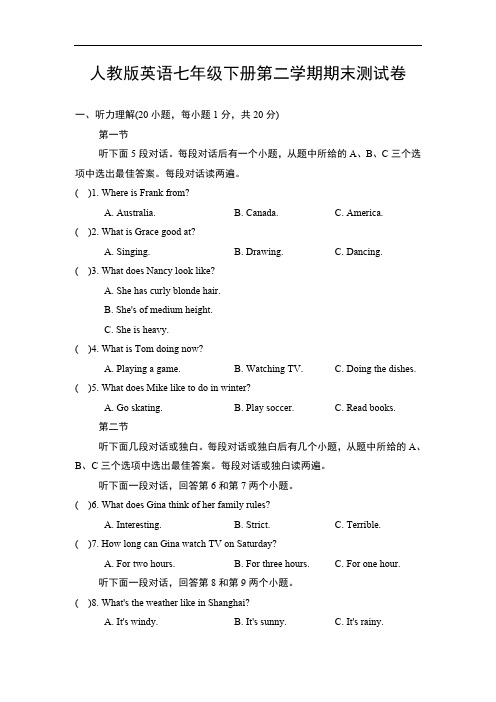
人教版英语七年级下册第二学期期末测试卷一、听力理解(20小题,每小题1分,共20分)第一节听下面5段对话。
每段对话后有一个小题,从题中所给的A、B、C三个选项中选出最佳答案。
每段对话读两遍。
( )1. Where is Frank from?A. Australia.B. Canada.C. America.( )2. What is Grace good at?A. Singing.B. Drawing.C. Dancing.( )3. What does Nancy look like?A. She has curly blonde hair.B. She's of medium height.C. She is heavy.( )4. What is Tom doing now?A. Playing a game.B. Watching TV.C. Doing the dishes. ( )5. What does Mike like to do in winter?A. Go skating.B. Play soccer.C. Read books.第二节听下面几段对话或独白。
每段对话或独白后有几个小题,从题中所给的A、B、C三个选项中选出最佳答案。
每段对话或独白读两遍。
听下面一段对话,回答第6和第7两个小题。
( )6. What does Gina think of her family rules?A. Interesting.B. Strict.C. Terrible.( )7. How long can Gina watch TV on Saturday?A. For two hours.B. For three hours.C. For one hour.听下面一段对话,回答第8和第9两个小题。
( )8. What's the weather like in Shanghai?A. It's windy.B. It's sunny.C. It's rainy.( )9. Who's studying for a test?A. Sam.B. Betty.C. Gina.听下面一段独白,回答第10至第12三个小题。
人教版英语七年级下册期末试卷(含答案)

人教版七年级下册期末试卷英语一、听力(共两节, 满分20分)第一节听下面5段对话。
每段对话后有一个小题, 从题中所给的A.B.C三个选项中选出最佳选项回答问题。
(共5小题;每小题1分, 满分5分)s.Sunday?A.Hi.sister....B.Hi.brother..C.Hi.friend.2.Wha.i.th.bo.doin.now?A.Playin.tennis.B.Playin.soccer.C.Playin.baseball.3.Wha.i.th.woma.lookin.for?A..bank..B..hospital..C..radi.station.4.Wha.i.th.boy’.siste.loo.like?A.Sh.i.tall.....B.Sh.wear.glasses...C.Sh.ha.shor.hair.5.Wha.doe.Ton.thin.o.hi.schoo.trip?A.Exciting....B.Relaxing.....C.Interesting.第二节(共15小题;每小题1分, 满分15分)听下面6段对话或独白。
每段对话或独白后有2-3个小题, 从题中所给的A.B.C三个选项中选出最佳选项回答问题。
听第六段对话, 回答第6.7小题。
6.Wher.i.Leo’.mom?A.I.th.shop......B.I.th.kitchen.....C.I.th.restaurant.7.Wha.doe.Le.d.t.hel.hi.mom?A.H.buy.som.cakes...B.H.goe.t..supermarket..C.H.put.th.cake.o.th.table.听第七段对话, 回答第8、9小题。
8.Wh.i.Maria?A.Frank’.sister......B.Frank’.friend......C.Frank’.cousin.9.Wha.doe.Mari.loo.like?A.Sh.i.ver.tall.....B.Sh.ha.blac.eyes....C.Sh.ha.curl.hair.听第八段对话, 回答第10、11小题。
- 1、下载文档前请自行甄别文档内容的完整性,平台不提供额外的编辑、内容补充、找答案等附加服务。
- 2、"仅部分预览"的文档,不可在线预览部分如存在完整性等问题,可反馈申请退款(可完整预览的文档不适用该条件!)。
- 3、如文档侵犯您的权益,请联系客服反馈,我们会尽快为您处理(人工客服工作时间:9:00-18:30)。
七年级英语试题
学校________班级________姓名________成绩________
A卷(满分100分)
第一部分 听力测试(共30小题,满分30分)
一.听句子,根据所听到的内容选择正确答语。每小题读两遍。(共5小题,满分5分)。
1.【此处可播放相关音频,请去附件查看】
3.【此处可播放相关音频,请去附件查看】
A. He is really tallB. He is reading .C. He is a student
4.【此处可播放相关音频,请去附件查看】
A. The hotel’s next to the post officeB. Yes, there is .C. How can I help you
A. He fed some horses thereB. He fed some cows there .C. He fed some chickens there
听下面一段较长对话,回答以下小题 【此处可播放相关音频,请去附件查看】
8. Where are Mike and Tony going tonight
A. Swimming.B. Shopping.C. Running.
五.听短文,根据短文内容完成表格中所缺信息,并将答案填写在答题卡的相应位置。短文读三遍。(共5小题,每小题1分;满分5分)。
【此处可播放相关音频,请去附件查看】
Here are___21___studends .
Wang Hui___22___and dances everyday .
四.听短文,根据短文内容选择正确答案。短文读两遍(共5小题,每小题1分;满分5分)。
【此处可播放相关音频,请去附件查看】
16. Where is Mary from ?
A. Beijing.B. America.C. Australia.
17. Which city does Mary live in now?
A. They’re going to the movie.B. They’re going to the school .C. They’re going to the park
9. Where are they going to meet?
A. Behind he cinema.B. In the cnema.
听下面一段较长对话,回答以下小题。【此处可播放相关音频,请去附件查看】
12. How far is the neighborhood to the zoo.?
A. It’s about 25 minutes’ walkB. It’s about 15 minutes’ walkC. It’s about 50 minutes’ walk
A. what does the criminal look likeB. what the criminal looks like .C. what is the criminal like
28.We havehomework to do , so we don’t havetime to play.
Li Hong learns___23___very well .
Yang Fang is___24___and likes playing basketball .
Zhang Mei usually helps her parents___25___some housework at home.
第二部分 基础知识运用(共30小题,满分40分)
5.【此处可播放相关音频,请去附件查看】
A. I am readingB. It’s sunnyC. Thank you
二 . 听句子, 选择与你所听到的句子意思相符合的图片,并将代表图片的字母填在答题卡相应的位置。每小题读两遍。(共5小题,每小题1分;满分5分)。
三 . 听对话,根据对话内容及问题选择正确答案。对话读两遍。根据对话内容完成11---20题。(共10小题,每小题1分;满分10分)。
13. Why does the boy like dogs.?
A. Because they are friendly and cute
B. Because they are smart and cute
C. Because they are friendly and smart
听下面一段较长对话,回答以下小题。【此处可播放相关音频,请去附件查看】
14. What would Frank like?
A. A bowl of noodles.B. A bowl of tomatoes.C. A bowl of dumplings.
15. What size would he like?
A. A small bowl.B. A medium bowl.C. A large bowl
B: Are there any vegetables in the beef noodles?
A: Yes.______37______
C:_______38_______
A: Some potatoes in the chicken noodles and some carrots in the mutton noodles.
六.选择填空(共15小题,满分20分)。
A. 从各题的A, B, C选项中选择正确答案。(共10小题,每小题1分; 满分10分)。
26.Mary isexcellent girl. She playsviolin very well.
A./; theB.an; theC.a; a
27.They tell him.
听下面一段较长对话,回答以下小题。【此处可播放相关音频,请去附件查看】
6. Where did Jack go last weekend?
A. He went to the zooB. He went to the countryside.C. He went to the farm.
7. What did he do there?
A. too much ; much tooB. too many ; many tooC. too much ; much
29.Look ! There are many girlsunder the tree .
A. are dancingB. to danceC. dancing
30.For the students in one small village in China , ________the river to school is difficult .
B: OK. I’d like one bowl of beef noodles then.
A: Sure._____39_____
B: Large, please. I’m very hungry.
C: And_____40_____
A: OK. A large bowl of beef noodles and a medium bowl of chicken noodles. Wait a minute, please. They’ll be OK soon.
10. Who is going with them?
A. MikeB. A FriendC. David
11. What does David look like?
A. He is of medium heightB. He has black hairC. He doesn’t wear glasses .
34.---What did you have for breakfast this morning?
---Ian egg andsome milk.
A. ate ; drankB. eated ; hadC. bought ; ate
35.---?
---It’s very hot .
A. How ’s the weather todayB. What’s the weather todayC. How ’s it going
A. Shanghai.B. Beijing.C. Jilin.
18. How old is Mary ?
A. Thirteen.B. Fourteen.C. Fifteen.
19. How is the weather in Beijing ?
A. RainyB. FineC. Cold
20. What sport does Mary like ?
A. crossB. crossingC. across
31.---does it take to get to school ? --- It takes about 15 minutesfoot .
A. How far ; onB. How long ; onC. How often ; by
32.---May I take the book out of the reading room ?
A.We went boating last weekendB.Yes ,we didC.We are boating.
2.【此处可播放相关音频,请去附件查看】
A. I usually go to school by bikeB. I usually get up at six fortyC. It’s rainy
A. And what is in the chicken noodles?
B. I’ like a medium bowl of chicken noodles.
C. But what kind of noodles do you have?
